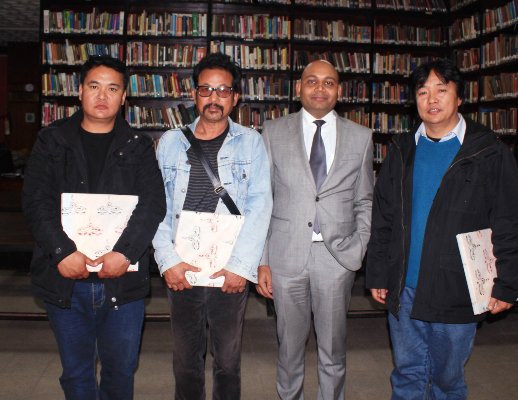
Indian Embassy and B.P. Koirala India-Nepal Foundation organized 20th edition of Voices on November 10, 2014 at Nepal-Bharat Library in Nepal Airlines Building, New Road.
This edition of Voices had eminent Indian author Namita Gokhale presenting a talk on “Across Borders: Literary Culture in South Asia”. Gokhale began her talk by sharing how languages have been travelling across South Asia and beyond to share cultural diversities and lifestyle of people.
She began, “I am extremely happy to notice this of late how people are not only investing time and energy in making money and buying lands, but also in promoting reading and writing culture.”
She added, “India is slowly transforming from being a feudal society to a knowledge society. This diversity in language becomes clear in Jaipur Literature Festival, where 250,000 writers and readers visit. India alone has 22 official languages and 1726 mother tongues. There’s a saying that water and language changes in every 25 kilometers in India. Moreover, South Asian Literature has a cultural connectivity now.”
She further enunciated, “Salman Rushdie, despite being a British born, partly Pakistani, popularized Indian English Literature when he introduced sounds of Bombay in English Literature. This is how language has been travelling across South Asia and world.”
Gokhale then highlighted how languages are shared across geographical boundaries. She shared, “Take for example, Tamil is spoken both in India and Sri Lanka. Bangla is one of the most sweet and radical language. Bangla speakers in the world are more than those speaking in French. The imprint of Bangla came from Tagore, Sunil Gangopadhyaya and Satyajit Ray. Malayalam is the second biggest language in the Middle East. Malayalam is spoken along with Tamil in Singapore as well. Urdu and Hindi language was originally called Hindustani. Urdu culture has Nepali connections too. The ghazals of Nepal have a base of Urdu dialect. Sindhi is a great literary tradition, which is commonly shared in India and Pakistan. Bhutanese and North-east share their language. The whole Himalayan belt in South Asia understands Nepali language. It deeply fascinates me how language travels across borders.”
She further added on mythology and literature, and how this has connected people together, with examples of Ramayan and Mahabharata. “In India, the bestselling book is either about cricket or mythology,” she said.
Gokhale also mentioned the need of exposure in Dalit literature and the oppressed scenario of woman participation in literature in South Asia.
“There are people who still think that all that a woman can write about is on prostitution and on her flesh. This mindset needs to change,” she stressed and concluded, “We also need to keep ourselves in a healthy distance from the emerging globbish language – the trend of – yes, no, thank, sorry and the distorted abbreviations like i luv u. English certainly is a uniting language but we should not write in native languages and dream in English.”
According to a press release issued by Indian Embassy, at the end of the event Namita Gokhale engaged in interaction with the audience.
Secretary of B.P. Koirala India-Nepal Foundation, Abhay Kumar thanked Gokhale and said, “Namita Gokhale is one of those few eminent Indian writers who has been contributing immensely in translating Indian literature into English and vice versa. She is also the mind behind one of the biggest literature festival of the world – Jaipur Literature Festival.”
- TANAHU HYDROPOWER PROEJCT: A Significant Achievement
- Apr 15, 2024
- AMBASSADOR HANAN GODAR: Sharing Pain With A Nepali Family
- Mar 30, 2024
- VISIT OF KfW AND EIB TO NEPAL : Mission Matters
- Mar 25, 2024
- NEPAL BRITAIN SOCIETY: Pratima Pande's Leadership
- Mar 24, 2024
- NEPAL ARMY DAY: Time To Recall Glory
- Mar 15, 2024
















